The publisher provided Play Critically with a review code for this videogame.
In Dredge, I play as a man who answers a help wanted ad for an angler in the small island town of Greater Marrow. While traveling there on his personal fishing boat, the player character wrecks on the jagged rocks that border the island bay. He wakes up in Greater Marrow the next day having lost all his possessions with his boat. The Mayor of Greater Marrow sets the fisherman up with a shabby, used boat and a flimsy fishing rod, then sends him out to work off his debt with an ominous warning: Return to town before nightfall when the fog sets in.
Thus begins my first day as a fisherman in the cursed islands that surround Greater Marrow in this combination fishing and psychological horror videogame.
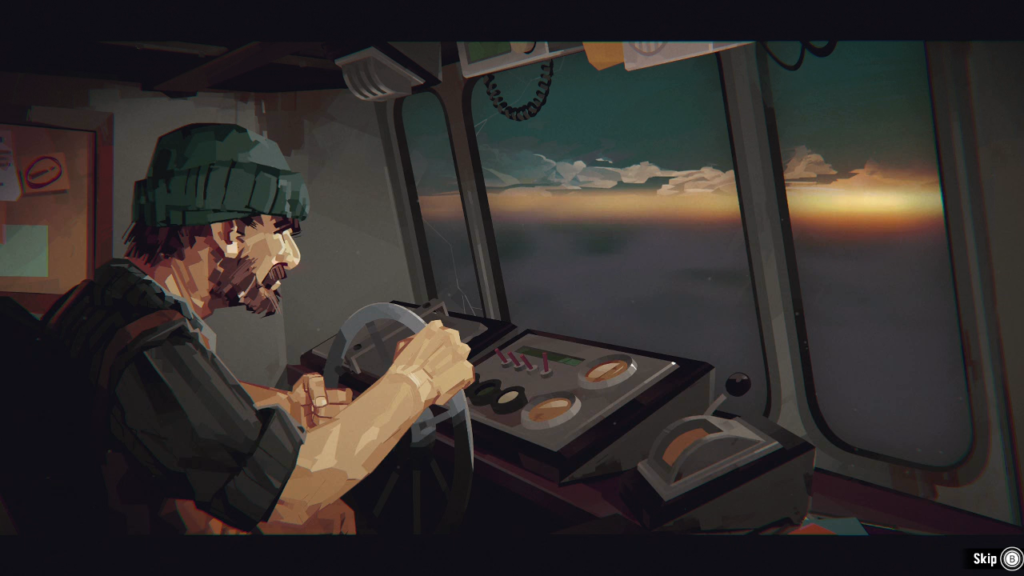
From the moment the player character awakens in Greater Marrow, I am immersed in Dredge’s haunting atmosphere. Characters like the Mayor, the Fishmonger, and the elderly Lighthouse Keeper are created with a jumble of jagged shapes, as though I am viewing them through a shattered mirror. Their portraits stare back at me with black, dull eyes hidden in shadow. I see their essence, but not their true form. Nobody ever seems to sleep, though all seem perpetually exhausted.
When out on the ocean, Greater Marrow’s overt creepiness is replaced by diffused loneliness. The cries of seabirds, the rolling of waves, and the color grey are the fisherman’s main companions, interrupted occasionally by a mournful piano tune that seems to come and go unprompted. It takes me a while to recognize the eeriest thing about this patch of ocean: There are no other ships. Through diligent exploration, I can discover other lonely towns and outposts supporting small populations, but nobody else seems to be making a living on the waves here other than my player character.
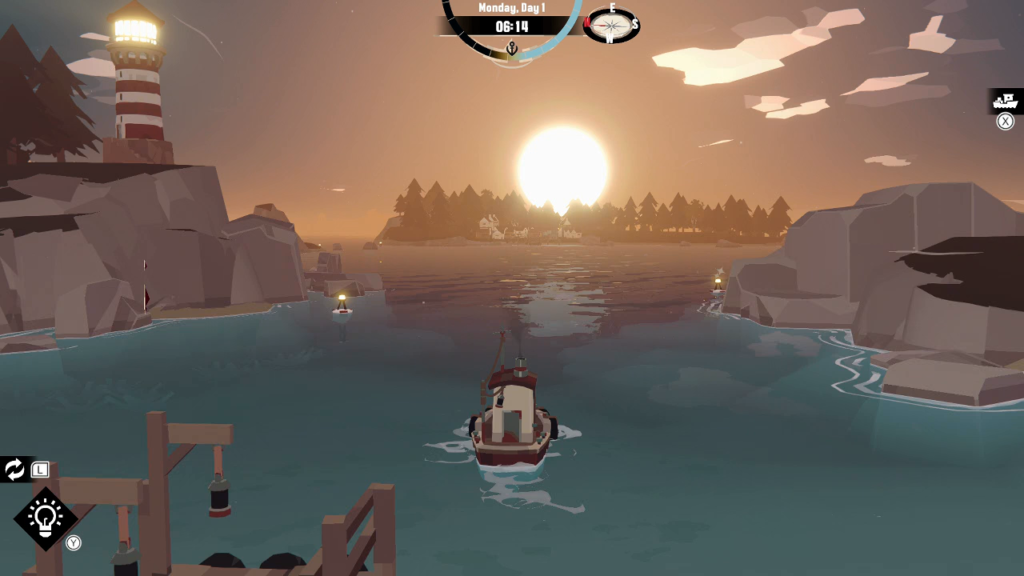
Time moves forward when the ship is in motion or when the player character is fishing and stands still when the boat stops or I study the encyclopedia. This is primarily a convenience for me as a player, but it cleverly serves double duty to add more to Dredge’s sense of unreality. Days pass by in mere minutes when I occupy the fisherman with his duties, but lingering on the world’s finer details makes a single moment last an eternity.
Out of curiosity, as I near the end credits, I aim the fisherman’s boat to the edge of the world map and let the throttle ride for several in-game days. When I swing the camera back around, the lighthouse at the map’s center is still within sight, as though the boat has barely moved at all. Time and space around Greater Marrow, or the fisherman’s perception of them, are simply wrong.
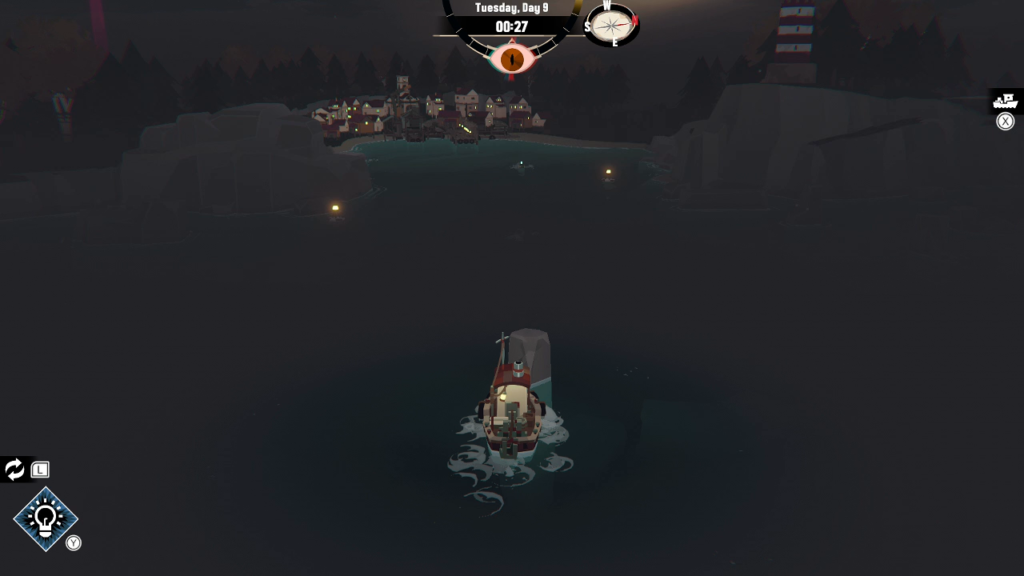
When night falls, the fisherman’s Tension meter begins to fill, represented by a searching eye near the top of the screen. The higher the Tension, the more nervously this eye’s gaze will flit, and the more dangerous obstacles will appear. The bay between Greater Marrow and the smaller town of Little Marrow on the opposite island is a good place to ease myself into Dredge’s horror mechanics. It is choked by impenetrable fog where jagged rocks jutting up from beneath the ocean appear from nowhere. The higher the fisherman’s Tension, the more these rocks will appear. If we visit the same spot in the daytime, the jagged rocks have vanished.
As the fisherman’s business draws us away from Greater Marrow to four nearby island clusters, we encounter new Tension-based threats. Black seagulls with red eyes divebomb the boat’s hold, stealing the fish we have caught. Clouds of swirling color envelope the boat and overwhelm the fisherman with indistinct whispers. At the highest Tension levels, a Kraken’s tentacle might emerge from the ocean to swipe at the boat, or a pure white shark with a glowing golden void in its mouth charges the boat with the speed and accuracy of a torpedo. Some of these threats even strike during the daytime.
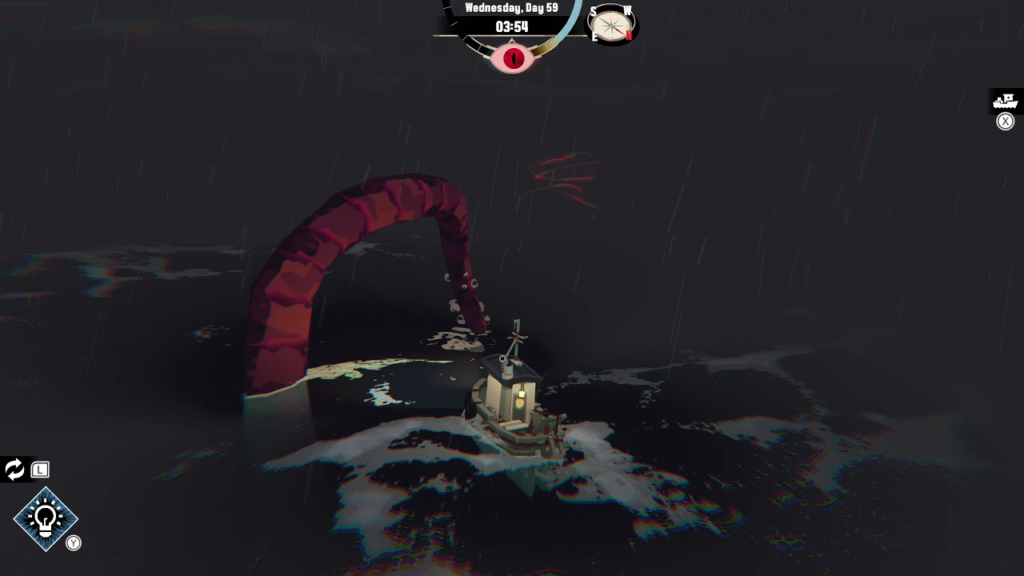
I could complain that a wandering eye is a poor barometer for understanding the fisherman’s current Tension, but I feel its vague readout adds to the uncertainty of the moment. As long as that roving eye is open at the top of the screen, I can never feel the fisherman is entirely safe. And while dealing with all these supernatural terrors, the fisherman still has to fish.
When I think of a fishing videogame, I imagine a laborious and rewarding process. I imagine searching out the perfect spot to catch a specific type of fish. Choosing a specific combination of rod, reel, and bait, then casting the line and patiently waiting for a fish to bite. Reeling in the hooked fish takes a long time. The fish struggles against its desire for life while I ensure I do not break my line or pole. Each fish I catch is a mystery waiting to be discovered; I can’t know what it is until I have won the battle and wrestled it onto the boat. Add to this challenge the knowledge that I might be pulling up a Lovecraftian sea monster, and I am thinking of an interesting videogame indeed.
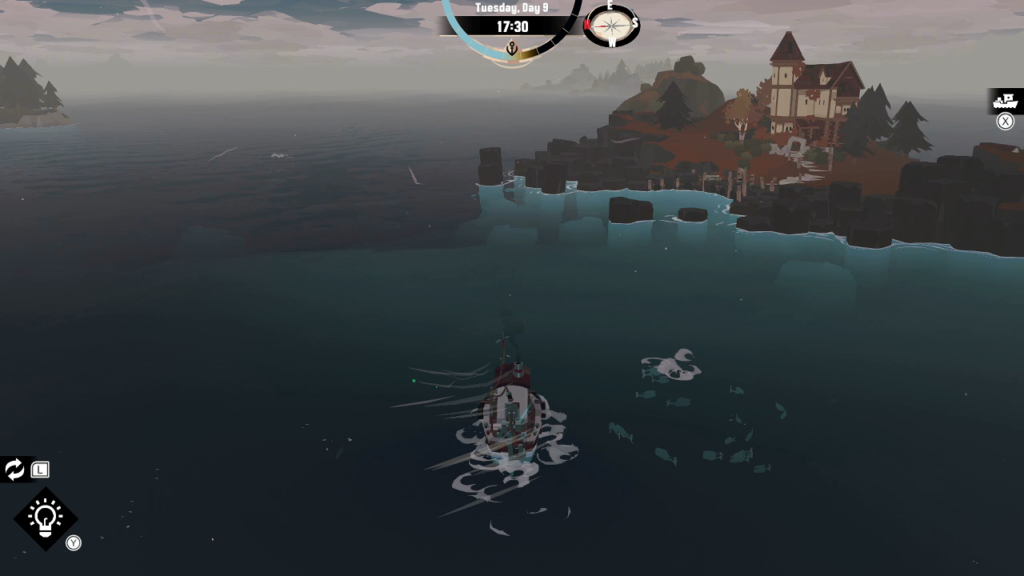
I must caution that Dredge is not a simulation fishing videogame. It instead opts for simple, fast-paced minigames to represent the player character’s trade. Fish are visible as shadows swirling amid disturbances on the water’s surface. I only have to park the fisherman’s boat on top of the shadows and press a button to begin catching them.
The process for catching fish is automated. A fish bites the line as soon as I press the “begin fishing” button and is automatically reeled up onto the boat. If I choose, I can wait for this automatic process to complete itself. It may take a few seconds, but every fish will eventually be hauled onto deck.
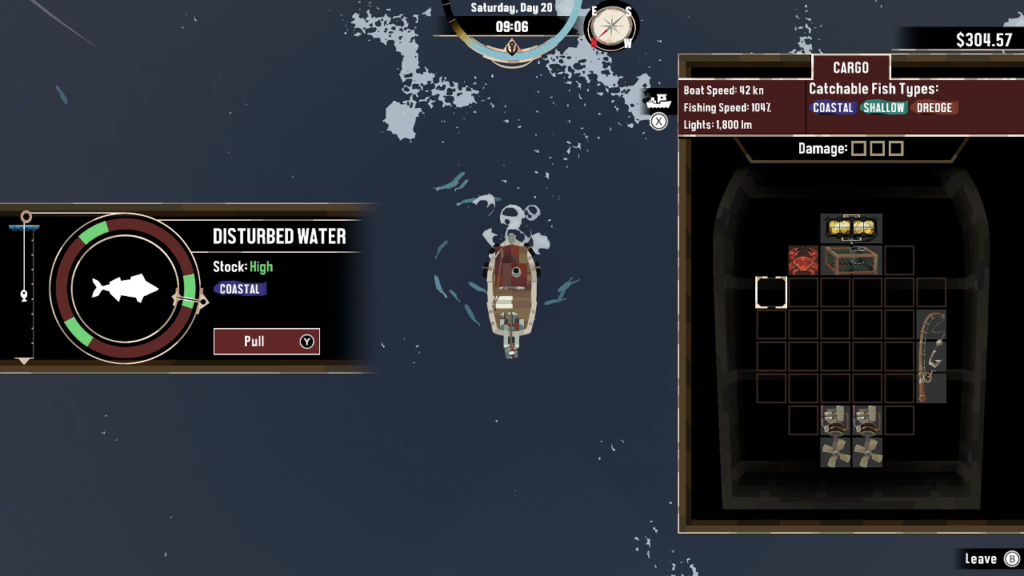
If I want to catch the fish a little faster, I can play a precision-based minigame. There are many variations of this minigame for each of Dredge’s 128 unique fish species, but the basic premise of most is to press a button as a cursor loops through green spaces dotted around a red ring. If I press the button with correct timing, then the fish is reeled up faster. If I press with incorrect timing, then the reel sticks and landing the fish takes longer. In a nice nod to different player abilities, there is an option to disable this mechanic for players who need it. With enough practice at each unique variation on the minigame, I can empty a spawning pool in only a few seconds.
At first I am disappointed that Dredge utilizes minigames instead of the familiar fishing simulation approach. I soon realize the advantages it brings to its horror theme. The frantic speed it imposes upon the fishing process keeps my stress and attention high and adds to the unreality of time in Dredge’s oceans. Fishing shouldn’t be this fast and easy, but it is, and that’s an unsettling feeling too.
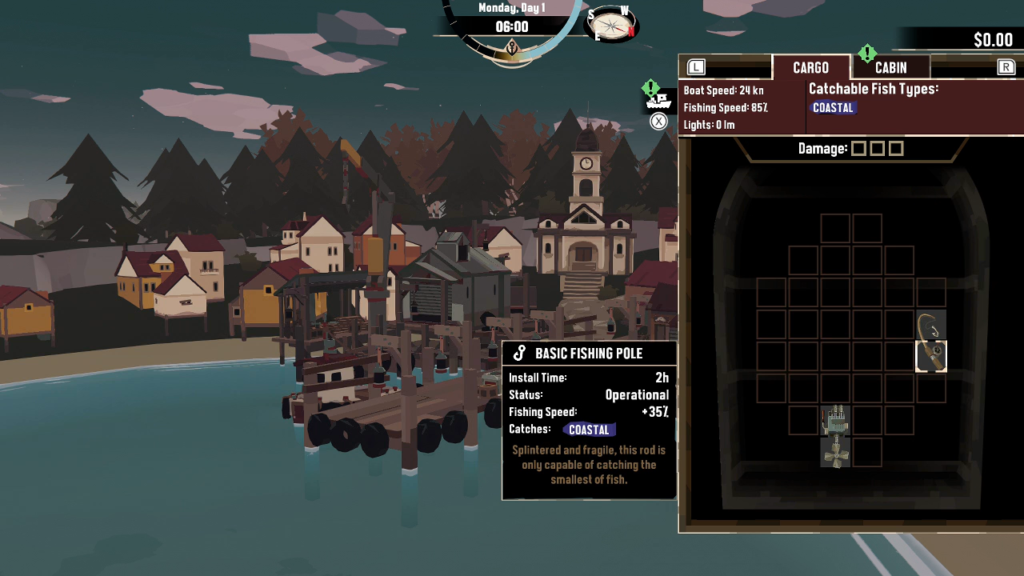
The boat given to the fisherman at Dredge’s beginning is a rudimentary vessel. It has a small hold that can’t carry many fish, it has a single Peculiar Engine that moves the boat at a sluggish pace, and a Basic Fishing Pole that can only capture Coastal-type fish. It isn’t long before the fisherman is asked to deliver fish his pole cannot catch.
Using rewards earned from sidequests and scrap material pulled from wrecks on the ocean’s floor, we can visit the Shipwright to purchase upgrades that improve the boat. New poles let us catch fish in new environments like Volcanic seabeds, swampy Mangrove coves, and even the Abyssal ocean depths. More and better engines move the boat faster and brighter lights cut through the nighttime fog with greater efficiency. A bigger boat can hold more fish and tools and take more hits before sinking.
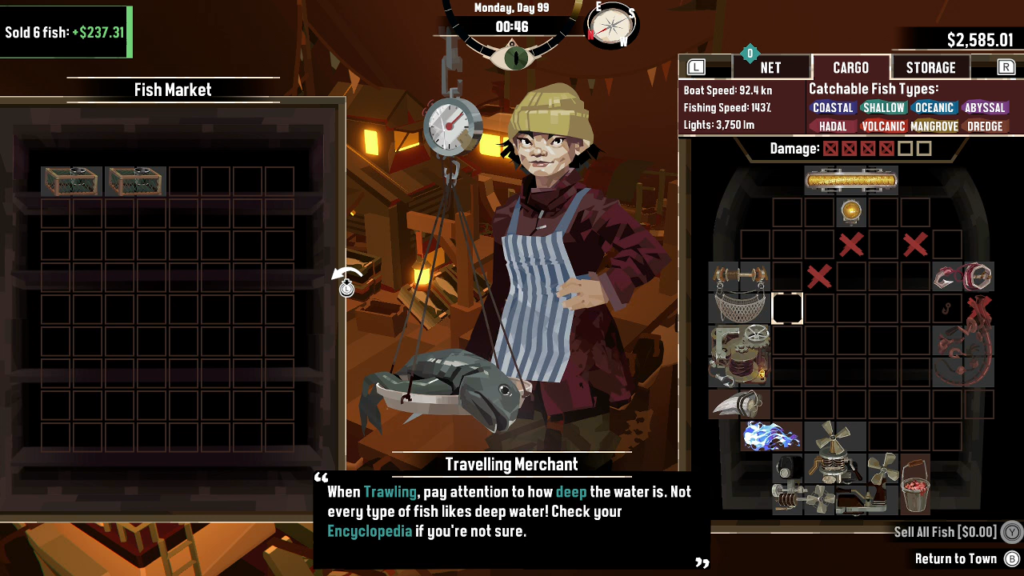
One of Dredge’s smartest design ideas is how inventory management works. The boat’s hold literally holds everything, from quest items to tools to valuable salvage to the occasional passenger and, of course, the fish we catch and sell. This means the more tools we bring, the less space there is for fish. The system is further complicated by marks which designate where tools are installed in the hold; if we have multiple fishing rods that take up seven spaces in the hold, but only five fishing rod marks in the hold itself, then I will be unable to equip both of them. I must pick and choose what I really need.
For the final twist, when the boat takes damage it creates random holes in the hold that persist until we visit a Shipwright to repair them. If these holes are created on top of a tool, then it is disabled. If they appear on a fish or treasure, then it is lost to the ocean depths. This system creates a real sense of immediate peril. The boat will sink if it takes enough damage, sending me back to the last time the boat was docked, but even a small amount of damage can potentially cause a serious problem. I am incentivized to keep the boat in top shape at all times.
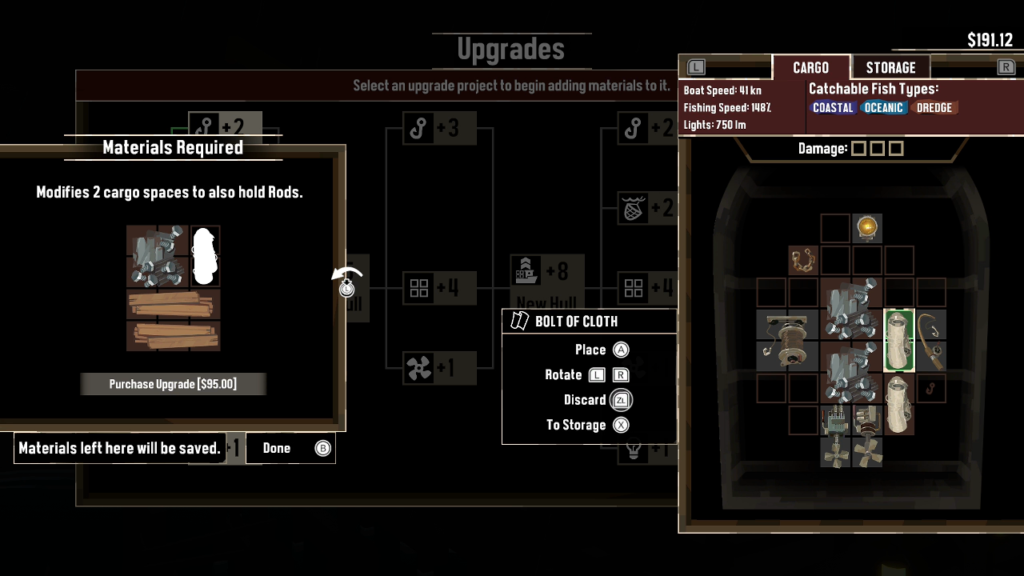
In the ten hours it takes me to finish Dredge, I upgrade the boat from a slow craft with a tiny inventory that can only capture fish near the ocean’s surface to a speedy tank with a massive hold that can fish in any depth and environment. I even add crab pots and trawling nets to the hold, creating opportunities for new catch without having to stop at every spawning pool. My sense of progress is most immediately felt through the boat’s advancement, and I derive the most satisfaction from Dredge through these upgrades.
Through all the horror and fishing, there is also a narrative to carry me and the fisherman through Dredge. Shortly after we begin work in Greater Marrow, we are visited by an aristocratic man in glasses who offers us work besides our fishing job. He is the Collector, and he is searching the nearby ocean for artifacts that have been lost to the sea floor. He enlists our aid in retrieving these items, installing the dredging tools onto the boat needed to salvage these artifacts.
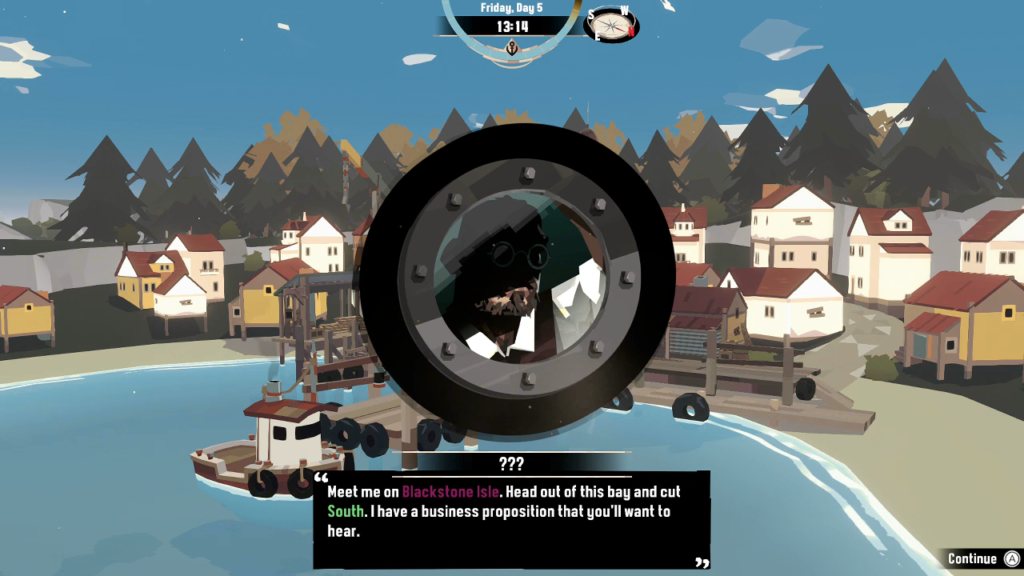
Though fishing remains the primary source of income throughout the adventure, pursuing these artifacts immediately takes over as Dredge’s guiding light. It is immediately apparent that these artifacts are the source of the supernatural occurrences, and recovering them takes the fisherman to every major location. There are five island clusters to explore: The Marrows, Gale Cliffs, Stellar Basin, Twisted Strand, and Devil’s Spine. Each is a unique biome with unique hazards to avoid, fish to capture, and a single cursed artifact to discover. When I have visited each island cluster in a prescribed order and returned all the artifacts, the story ends.
I discover two distinct endings after returning all the artifacts to the Collector, and both of them disappoint me. One is an obvious twist ending, an eye-rolling conclusion to a psychological horror videogame. The other has a more vague resolution but with hints at a happier outcome for the people of Greater Marrow. Both require me to deliver the fisherman to a point on the map, whereupon the story unceremoniously ends. A final confrontation would have been appreciated, but there simply isn’t one. Dredge begins with an explosion of horror and mystery; it ends with a puff of cliché and indifference.
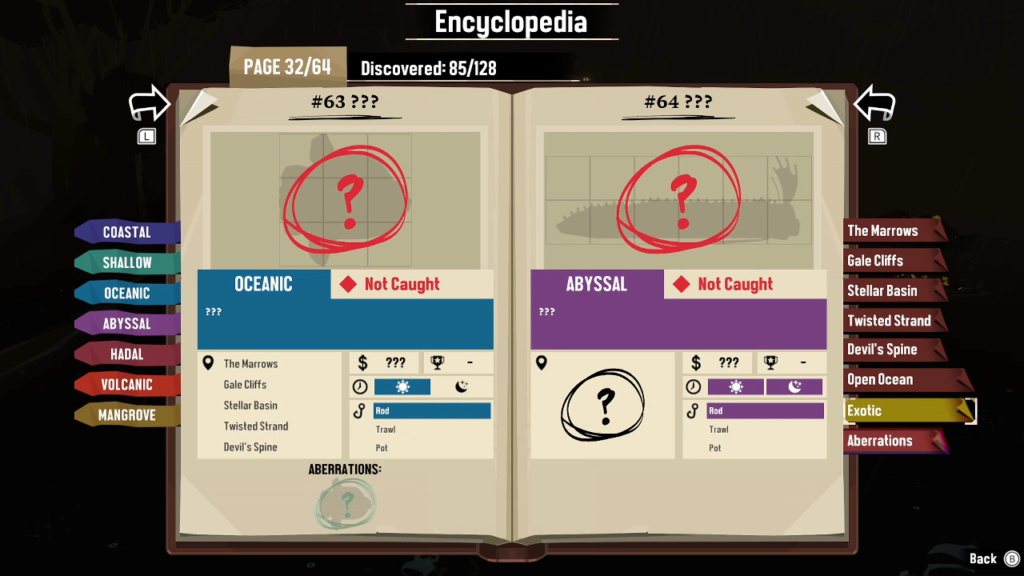
Story simply isn’t Dredge’s primary focus, and it doesn’t need to be to create an engrossing experience. Though the hunt for the Collector’s artifacts draws me to all corners of the map, it is my desire to capture all the fish, complete all the sidequests, and discover every hidden secret that keeps me interested.
Even as the credits roll, I still have over fifty fish to capture to fill out the fisherman’s encyclopedia. Most of these are Aberrations, rare mutations of fish that appear randomly in pools alongside their more common varieties. Some of the sidequests can be frustrating—one set involving hooded men who request specific types of fish are time limited, and I don’t complete a single one of them before the hooded men seemingly starve to death. The unmarked secrets are perhaps the most fascinating. Shrines dotted across the islands can be opened by offering up specific types of fish. They reward the fisherman with macabre and obviously supernatural fishing equipment that can give a decisive edge if I seek them out.
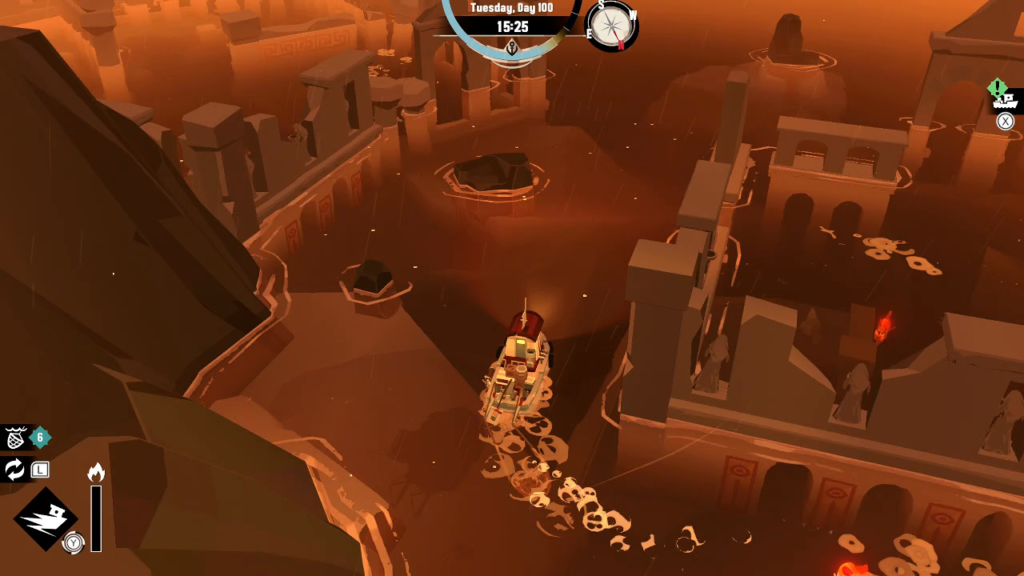
Dredge is the most interesting indie videogame of 2023 so far. I particularly enjoy its setting. At first glance, the islands around Greater Marrow appear ordinary, supporting a simple fishing videogame where the fisherman and I catch fish, sell them for money, and upgrade the boat so we can catch more fish. This proven and effective loop is bolstered by the horror mechanics. Dredge is never truly scary, but its many mechanics layer palpable stress and paranoia on top of ordinary entrepreneurial design. That the story is predictable, mostly forgettable, and ends in an anticlimax barely matters. The rest of Dredge is engrossing and original. It’s the first don’t-miss indie of the year.